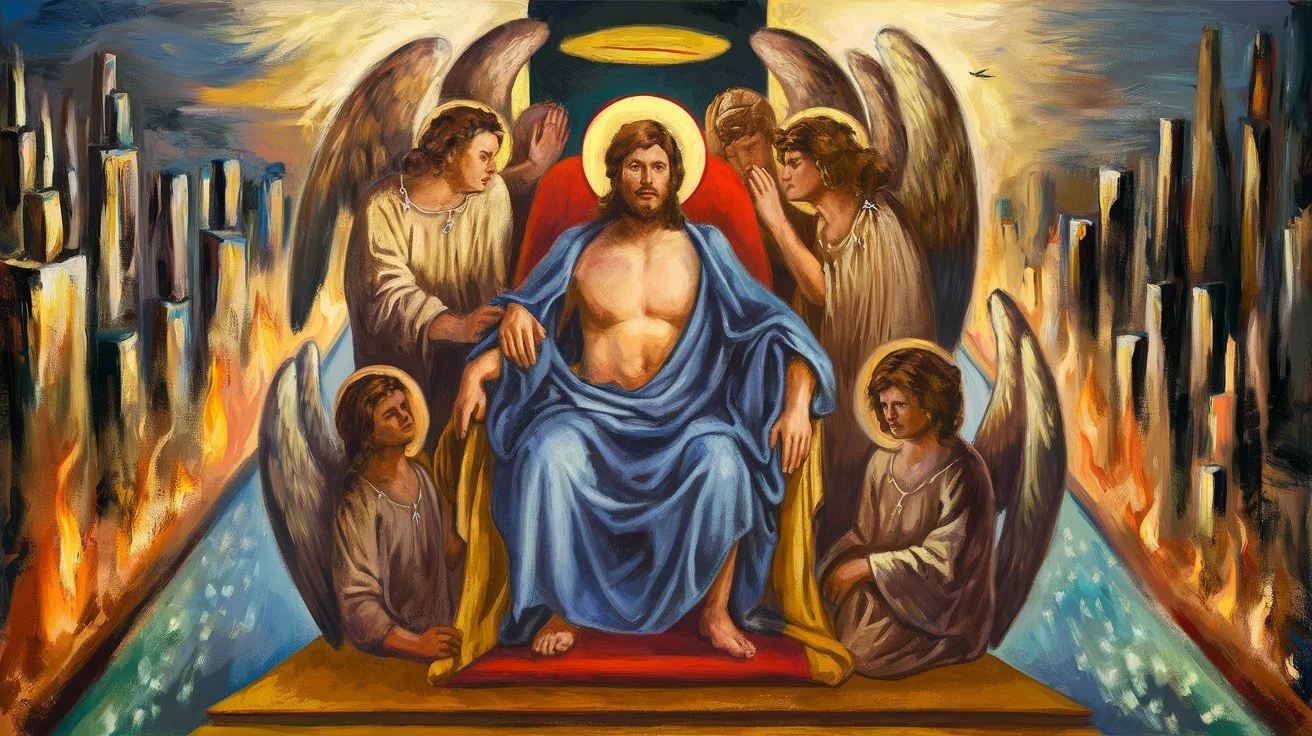Disclaimer: This article aims to provide an informative overview of the role of dreams in conversion stories within Christianity and Islam. The content is based on established sources and aims to maintain a neutral point of view. All references are provided at the end of the article for verification and further reading.
Dreams hold significant roles in the conversion stories and spiritual experiences in both Christianity and Islam.
Throughout history, they have been seen as a medium through which divine messages, guidance, or warnings are delivered.
These dream experiences have often played key roles in the narratives of individuals transitioning between or reaffirming their faith.
Dreams in Christianity: Conversion Stories
In Christianity, dreams have been important for divine communication, appearing prominently in both the Old and New Testaments.
For many, especially in historical and modern conversion stories, dreams have played a profound role in spiritual transformation and leading individuals toward faith.
Several key figures in the Bible experienced significant dreams:
- Joseph (Genesis 37) had prophetic dreams that foretold his future leadership and the salvation of his family.
- The Magi (Matthew 2:12) were warned in a dream not to return to Herod after visiting baby Jesus.
- Paul (Acts 16:9-10) had a vision of a man from Macedonia, which led him to preach in Europe.
Constantine the Great’s Conversion Story
One of the most famous conversion stories in history is that of Constantine the Great, the first Roman Emperor to convert to Christianity.
His conversion marked a pivotal turning point for Christianity, transitioning it from a persecuted minority faith to the dominant religion of the Roman Empire.
Background
Born in 272 AD, Constantine ruled as Roman Emperor from 306 to 337 AD. His conversion is closely linked to a dream or vision he experienced before the Battle of the Milvian Bridge in 312 AD.
The Dream
Before the decisive battle against his rival Maxentius, Constantine is said to have had a dream or vision in which he saw a cross of light in the sky, accompanied by the Latin words “In hoc signo vinces,” meaning “In this sign, you will conquer.”
Interpreting this as a divine message from the Christian God, he instructed his soldiers to paint the Christian symbol, the Chi-Rho (☧), on their shields.
The Impact
Constantine’s army emerged victorious, and he attributed his success to the Christian God.
Following the battle, he favored Christianity and, in 313 AD, issued the Edict of Milan, which granted religious tolerance to Christians and allowed them to practice their faith openly. This edict also returned confiscated properties to Christians and marked the end of their persecution in the Roman Empire.
Though Constantine was not baptized until shortly before his death in 337 AD, his reign significantly advanced Christianity, leading to its eventual status as the state religion of the Roman Empire. His conversion story, rooted in a dream, is one of the most influential in Christian history.
Conversion Stories Involving Dreams
Many Christians, particularly in modern times, have shared that dreams of Christ or biblical themes led them to convert to Christianity. Some notable aspects include:
- Dreams of Jesus: Numerous accounts exist of individuals, especially in regions where Christianity is not the dominant faith, having dreams or visions of Jesus that prompt them to explore Christianity and eventually convert.
- Visions of Angels: Some conversion stories include individuals who report seeing angels in their dreams, guiding them toward the message of Christ.
Notable Converts to Christianity
- Nabeel Qureshi
A former Muslim, Qureshi converted to Christianity after experiencing profound dreams that challenged his beliefs. His memoir, “Seeking Allah, Finding Jesus,” illustrates how these spiritual encounters led him to explore and ultimately embrace Christianity. - Tom Doyle
An author and missionary, Doyle documents numerous accounts of Muslims experiencing dreams of Jesus that lead to conversion in his book, “Dreams and Visions: Is Jesus Awakening the Muslim World?” - St. Paul (Saul of Tarsus)
St. Paul’s transformation on the road to Damascus (Acts 9) is rooted in a vision of Jesus, marking a pivotal moment that led him to become one of the most influential apostles of Christianity.
Dreams in Islam: Conversion Stories
In Islam, dreams are regarded as significant spiritual experiences, often seen as messages from Allah or guidance toward the truth. The Islamic tradition holds that dreams can have special significance, particularly for those on a path toward conversion or seeking spiritual clarity.
Qur’anic and Hadith References
In Islamic texts, dreams have been pivotal in conveying divine will:
- Prophet Ibrahim’s (Abraham’s) Dream: In the Qur’an (Surah As-Saffat, 37:102), Prophet Ibrahim has a dream commanding him to sacrifice his son, Ismail (Ishmael), as a test of faith. This dream is commemorated during Eid al-Adha.
- Prophet Muhammad’s Dreams: Prophet Muhammad reportedly had several meaningful dreams that provided divine guidance. One key hadith states, “The dreams of the faithful are one of the forty-six parts of prophecy.” (Sahih al-Bukhari).
Notable Converts to Islam
- Yasmin Mogahed
An American author and speaker, Mogahed converted to Islam after experiencing personal struggles. She recounts significant dreams that guided her understanding of Islamic principles. - Jewel (Jewel Kilcher)
The singer-songwriter has spoken about her spiritual journey, which included encounters with Islamic teachings and dreams that resonated with her quest for faith. - Michael Wolfe
Wolfe, an author and filmmaker, converted to Islam after experiencing a series of dreams and spiritual realizations. His book, “One Thousand Roads to Mecca,” shares how dreams influenced his understanding of faith.
Common Themes in Dreams Across Both Faiths
- Divine Encounters: Both Christianity and Islam hold that divine figures, such as Jesus or the Prophet Muhammad, may appear in dreams to guide individuals toward truth and faith.
- Crisis and Resolution: Many of these narratives emerge during periods of personal crisis, where dreams provide clarity or reassurance about the right path forward.
- Community and Belonging: After conversion, many individuals express a profound sense of belonging within their new faith, reinforcing their commitment.
Final Thoughts
Dreams have historically played a significant role in the conversion experiences of individuals in both Christianity and Islam.
Whether through visions of Jesus, prophetic figures, or divine guidance, dreams continue to be a profound part of spiritual journeys, offering personal insights, encouragement, or direction toward faith.
In both religions, these dream experiences are viewed as powerful tools for divine communication and transformation.
References
- Joseph’s Dream: Genesis 37.
- The Magi: Matthew 2:12.
- Paul’s Vision: Acts 16:9-10.
- Stein, Dave. “Dreams in Christianity and Islam: The Conversion Stories.” DreamInterpreter.org, 17 Sept. 2024.
- “Dreams and Visions: Is Jesus Awakening the Muslim World?” by Tom Doyle.
- St. Augustine’s Confessions.
- “Seeking Allah, Finding Jesus” by Nabeel Qureshi.
- Qur’an, Surah As-Saffat (37:102).
- Sahih al-Bukhari 7017.
- “The Life of the Prophet Muhammad” by Ibn Ishaq.
- “Dreams and Spirituality: A Handbook for Ministry, Spiritual Direction, and Counseling” by Kate Adams, Bart Koet, and Barbara Koning.
- “Dreaming in the World’s Religions” by Kelly Bulkeley.
Dave Stein is a leading dream interpreter known for helping people make sense of their dreams. With over 20 years of experience, he uses a mix of psychology and intuition to offer practical insights that help people understand themselves better. Dave also leads workshops and offers personal consultations, sharing his knowledge to help others unlock the deeper meaning of their dreams.



